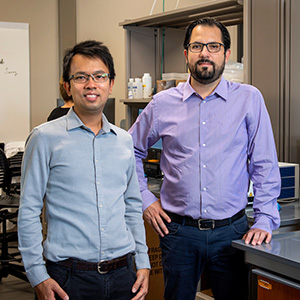|
|
|
|
|
|
 | S
|
Legislature Authorizes $113.4 million for Science and Technology Research Building
Despite hurdles presented by the global pandemic, UNT set record growth in research productivity last year. Unprecedented gains in new research grants and proposals and overall research expenditures reflect the university's rise as a major national research university. The total number of research proposals rose 17% from $213 million in fiscal year 2020 to $251.4 million in fiscal year 2021, which ended Aug. 31. The university secured its highest-ever level of external funding, with a 25% increase from $39.9 million to $50.0 million in sponsored awards. UNT Vice President for Research and Innovation Mark McLellan said the record success was a testament to the tenacity and hard work of its research faculty who persevered while managing COVID-19 conditions, including reduced staffing and travel restrictions. Notable achievements include a $5.5 million grant from the Army Research Laboratory awarded to a team of researchers with UNT's Advanced Materials and Manufacturing Processes Institute and a prestigious Young Faculty Award from the Defense Advanced Research Projects Agency awarded to Ifana Mahbub, assistant professor of electrical engineering.
|
|
|
|
|
|
|
|
 Designing Proteins to Reprogram Living Cells Designing Proteins to Reprogram Living Cells
Researchers at the University of North Texas and the University of Texas at Dallas have, for the first time, modified the compatibility of proteins in cells by building connections at the molecular level that did not exist before. UNT's Clement Chan and UTD's Faruck Morcos are working to discover new ways to modify proteins to change the way cells behave to improve the health of living organisms and provide applications for industrial, agricultural and environmental use. They have created a coevolutionary modeling approach that engineers mutations in combined proteins, ensuring their compatibility and eliminating costly, time-consuming trial and error. Their research was recently published in Nature Communications.
|
|
|
|
|
|
| Plant Scientists Develop New Methods for Cotton Research |
With one-third of the total U.S. cotton production in Texas, a research team in the laboratories and greenhouses at UNT's BioDiscovery Institute could have significant economic impact with the broad applications. Brian Ayre, Roisin McGarry and Jyoti Shah are working to reduce damage to cotton plants from aphids and Fusarium fungal infections with a National Institute of Food and Agriculture grant from the U.S. Department of Agriculture for research. Their work could considerably reduce the need for insecticides and fungicides. They hope to speed up research by bypassing the amount of tissue culture required to test important genes in the plant. "If it works for this particular problem in cotton, then it also can work for other problems," Ayre says adding the research could be used for other crops as well. "And that could really change the way we conduct biotechnology."
|
|
|
|
|
|
|
| Trauma-informed Treatment |
|
A UNT professor is working to help adults with intellectual disabilities, who may not be able to verbalize their feelings, through trauma-informed research and treatment plans. Joe Dracobly, director of UNT's Behavior Analysis Resource Center and assistant professor of behavior analysis in the College of Health and Public Service, is working to establish physiological and behavioral signs of trauma responses in adults who cannot verbally express what they're feeling. Through the center, he leads a team of students and professionals who treat residents at the Denton State Supported Living Center.
|
|
|
|
|
|
|
| Health Holds Sway in Consumer Textile Furnishing Buying |
|
Hae Jin Gam, associate professor of fashion design in the College of Visual Arts and Design, researches sustainability development in the apparel and textile industry. In a recent study, Gam and her collaborators analyzed data from a survey of U.S. shoppers and found that health consciousness influences consumers' purchasing intentions of environmentally sustainable textile furnishing products such as carpets, curtains and fabric sofas. Their article in the Family and Consumer Sciences Research Journal received a "Best Paper" award from the American Association of Family and Consumer Sciences.
|
|
|
|
|
|
|
| Studying High-temperature Alloys for the Air Force |
|
Materials science and engineering researcher Rajarshi Banerjee is rethinking the types of alloys used for aircraft to allow jet engines fly faster and operate at higher temperatures in a more fuel-efficient manner. With a new grant from the Air Force Office of Scientific Research, he'll study the fundamental research for developing the next generation of high-temperature alloys and push the thermal boundaries of high entropy alloys using refractory elements, such as niobium, tantalum, zirconium or hafnium — that haven't yet been investigated.
|
|
|
|
|
|
|
| Broader Impacts of Plant Communication |
|
Kent Chapman and Mina Aziz, researchers at UNT's BioDiscovery Institute, have received a $1 million grant from the National Science Foundation to look at how plants talk to their microbial neighbors — specifically the role of fatty acid amide hydrolases, which exist broadly in plants, in communication between plants and microorganisms. Their project could have broad impacts for agriculture and basic science while developing research skills in scientists of the future.
|
|
|
|
|
|
|
| Analyzing Complications in Type 2 Diabetes |
|
Manuel Axel Ruiz, a doctoral student working in the laboratory of Pamela Padilla, dean of the College of Science, is researching how a glucose-supplemented diet can impact neuronal morphology and function. He analyzes the cause and effects of complications that arise in Type 2 Diabetes with hopes of provide greater insights on what molecular mechanisms are involved in the development of diabetes complications and identify biomarkers that could help doctors in the early detection of nerve damage associated with the disease.
|
|
|
|
|
|